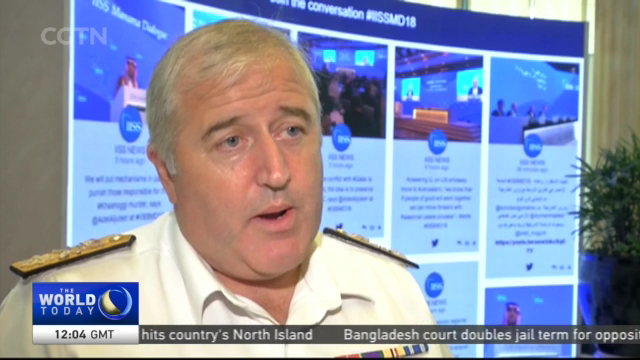
20:26, 30-Oct-2018
Strait of Hormuz: Combined maritime forces ramp up pressure on Iran oil exports, Tehran threatens to retaliate
Updated
19:46, 02-Nov-2018
03:15

The start-date for US sanctions targeting Iran's oil exports is fast approaching, and with it, a potential flash point in the region is heating up. There's been warnings from Iran in recent months they could close the Strait of Hormuz in retaliation. With global oil supplies at stake, the US and international naval forces based in Bahrain are patrolling the waters. The issue has been turning heads at the Gulf country's "Manama Dialogue" security conference- as Jacob Greaves reports.
JACOB GREAVES MANAMA "November the 4th is the key date that's when the Trump administration has previously stated countries will have to abide by sanctions on buying Iranian oil. But in recent months, Iran's President Hassan Rouhani said the country could in response disrupt regional oil shipments passing through choke point of the strait of Hormuz, around a fifth of global oil shipments pass through the narrow strait, raising questions of what forces Tehran can bring to bear.
NICK CHILDS IISS SENIOR FELLOW FOR NAVAL FORCES AND MARITIME SECURITY "Traditionally what we've seen with the Iranian Revolutionary Guard is the use of high speed gunboats, to harass US navy warships. There is concern about missile threat in the Strait of Hormuz if it comes to serious actions, the use of mines in terms of developing threats we've seen the use of drones shadowing, we've seen drones shadowing US warships recently."
JACOB GREAVES MANAMA "Here in Bahrain, it's a particularly topical subject. This is the base for the US fifth fleet, charged with patrolling the region. They've previously said they're ready to maintain the freedom of navigation. Bahrain also hosts a multinational naval force of 33 countries. We spoke to its second in command about the threat."
COMMODORE STEVE DAINTON COMBINED MARITIME FORCE "We're regularly in touch with our merchant shipping colleagues to make sure they know what the situation is both down in the Bab-el-Mandeb and the strait of Hormuz, to make sure we can make the right risk assessment at the time, to make the right measures and to make sure that free-flow of commerce that is so crucial to all of our economies, to global economies is maintained."
JACOB GREAVES MANAMA "The caveat is any action would further hurt Tehran economy and risk open military confrontation. But this all comes as US President Donald Trump aims to revive the so-called Arab NATO, an alliance of six Gulf countries and Egypt with the US, aiming to limit and squeeze Iran's regional influence. Here we've heard Mattis reference the need for greater cooperation, and Bahrain at this summit gave an ambitious timeline of having the alliance formed by next year. But we're still yet to hear details as to how it would work in practice, not least because currently the GCC is not even a united front, with Qatar economically blockaded by many of its neighbors."

SITEMAP
Copyright © 2018 CGTN. Beijing ICP prepared NO.16065310-3
Copyright © 2018 CGTN. Beijing ICP prepared NO.16065310-3